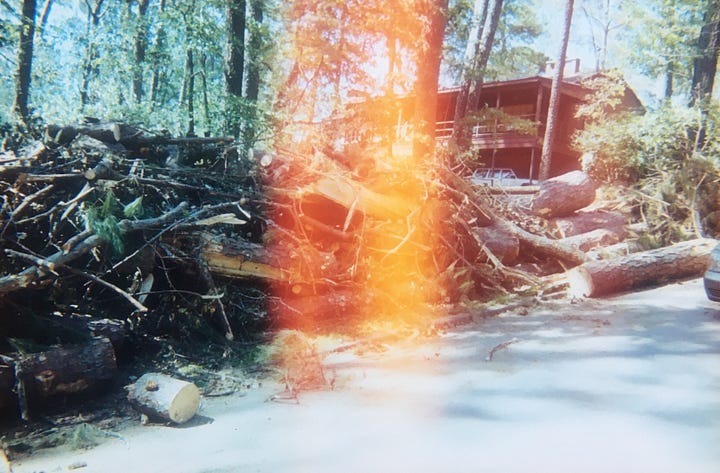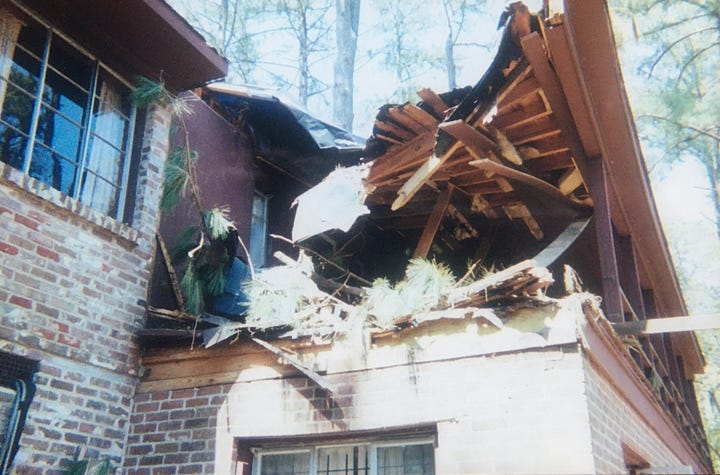“If you don't die of thirst, there are blessings in the desert.” Anne Lamott
I returned to Meridian happy enough to be back home and yet stunned by all the damage Katrina had done. Street after street had cords of fallen trees piled feet high along the curbs. Home after home had big blue tarps covering roofs that the trees had crushed. Many in our community were without electricity for days, even as the hot and muggy conditions of that summer persisted. Many of us had to vacate our homes while we awaited insurance claims and home repairs. I was lucky to be able to move in with my parents for the extended weeks. Others were not so lucky, especially those who filled our hotels from New Orleans and points in between.
It was an unusual and surreal time for so many. I could only compare it to a feeling I’d had years before after being T-boned late one night by another vehicle that had run a red light. I felt a heightened and yet numbed sense as I absorbed the reality of what had just occurred.


Even as I had my own home damage to contend with, I tried to be of service to others who needed help and did not have the same access to resources that I had. Through my volunteer work with Habitat, we were hosting information sessions for those outside our community who had been displaced by extensive damage or lost their homes completely. I couldn’t believe we were asking families to decide in only a few days, in the midst of this crisis, if they felt it would be better to start a new life in a new home in Meridian rather than move back to the community where most of them had lived all their lives. As they say, “Drastic times call for drastic measures.” But trite sayings didn’t make me feel any better about those families’ difficult decisions.
Although I was attempting during this time to stay engaged in tasks to return to some level of normalcy or wholeness, both for myself and others, I was beginning to feel less well. I was often shaky and sluggish, and found it harder and harder to find the energy for activity and motivation. All I wanted to do on the weekends was sleep or lie on the couch. I was losing weight and found it almost impossible to quench my thirst. My family and I weren’t aware of what these symptoms could mean. I dismissed them as signs of depression or anxiety I had experienced before, perhaps due to the stress after Katrina, or feeling once again like I had nothing on the horizon to look forward to, or even more, my deep-seated fear of being gay. Of course, I couldn’t figure out what all of these had to do with me feeling thirsty all the time. I simply could not quench my thirst, no matter how much I drank. This was a new manifestation.

Finally, after two months of feeling energetically depleted and losing more weight, I decided to go to the doctor. He had been my doctor since my youth and I felt the need to confess to him that I thought I was gay, thinking that this confession might relieve some of my mental and physical symptoms. This was a huge step for me to take. Not wanting to take the step was the primary reason I had put off going to my health care provider for so long. He received my news nonchalantly enough, sharing that he didn’t think there was anything wrong with me being gay. But he still wanted to do some blood tests to determine the cause of my present symptoms.
I don’t remember how much time passed before I got the results. But I do remember when I got them. On a Friday a couple of weeks before Christmas, I received a message to call my doctor. He informed me that my blood sugars were extremely elevated and he wanted to admit me to the hospital over the weekend to stabilize them and do more testing to determine the cause. I believe he told me that he was fairly certain it was some form of diabetes, but wasn’t yet sure if it was Type I or II.1 I agreed to be hospitalized, sensing that some kind of significant turning point had indeed occurred.
*Thanks for reading and/or listening. Continue to next post Dis-Ease. To read from the beginning please go to Why I'm Writing.
Have thoughts, questions, or feedback? Please comment — it means a lot to hear from you on this mostly solitary and introspective writing journey that I’m on.
“The two main types of diabetes are type 1 and type 2. In type 1 diabetes the body completely stops making insulin. People with type 1 diabetes must take daily insulin injections (or use an insulin pump) to survive. In type 2 diabetes the body produces insulin, but the cells don’t respond to insulin the way they should. This is called insulin resistance.” Joslin Diabetes Center https://www.joslin.org/patient-care/diabetes-education/diabetes-learning-center/difference-between-type-1-and-type-2


